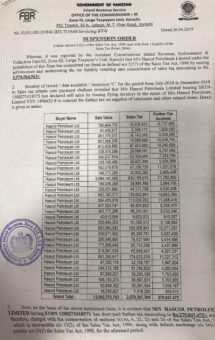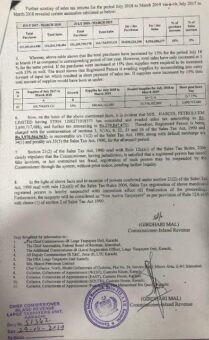ISLAMABAD: Federal Board of Revenue (FBR) on Thursday appointed 49 inspectors (BS-16) in Inland Revenue in order to strengthen the field force of tax offices.
The FBR appointed the tax officials on the recommendations of Federal Public Service Commission (FPSC).
The FBR also notified place of posting of those officials.
Following is the list of appointed officials and their place of posting:
1. Muhammad Mehboob-ur-Rehman Sabir, Regional Tax Office, Islamabad.
2. Rana Muhammad Awais, Regional Tax Office-II, Lahore.
3. Salman Munir, Corporate Regional Tax Office, Lahore.
4. Muhammad Kashif Iqbal, Regional Tax Office, Multan.
5. Muhammad Abrar Khan, Regional Tax Office, Gujranwala,
6. Zaighum Waqas, Regional Tax Office, Sargodha.
7. Muhammad Arif, Regional Tax Office, Rawalpindi
8. Waqas Zafar Kurar, Regional Tax Office, Gujranwala.
9. Makwdar Ali, Large Taxpayers Unit, Islamabad.
10. Zeeshan Waheed, Regional Tax Office, Rawalpindi.
11. Mohsin Khan, Regional Tax Office, Faisalabad.
12. Waqas Ali, Regional Tax Office, Islamabad.
13. Kamran Taj, Regional Tax Office-II, Karachi.
14. Yasir Sohu, Regional Tax Office-III, Karachi.
15. Shujah ud din, Regional Tax Office, Sialkot.
16. Nabil ur Rehman, Corporate Regional Tax Office, Lahore.
17. Syed Aijaz Ali Shah, Regional Tax Office-III, Karachi.
18. Muhammad Umair Shaikh, Regional Tax Office-II, Karachi.
19. Muhammad Usman, Regional Tax Office, Abbottabad.
20. Syed Zia ur Rehman, Regional Tax Office, Peshawar.
21. Naveed Ahmad, Regional Tax Office, Peshawar.
22. Suhail Afzal, Regional Tax Offce, Hyderabad.
23. Ahmad Baig, Regional Tax Office, Rawalpindi.
24. Muhammad Kashif, Regional tax Office, Islamabad.
25. Muhammad Irfan, Regional tax Office, Peshawar.
26. Yaqub Shah, Regional Tax Office, Peshawar.
27. Obaid Ullah, Regional Tax Office, Quetta.
28. Muhammad Wasif, Regional Tax Office-II, Karachi.
29. Sohaib Zafar, Regional Tax Office-III, Karachi.
30. Muhammad Ali, Regional tax Office, Quetta.
31. Sovia Mukhtar, Corporate Regional Tax Office, Lahore.
32. Maryam Bibi, Regional Tax Office, Rawalpindi.
33. Maryam Yaqoob, Regional Tax Office, Gujranwala.
34. Nazia Ghazal, Regional Tax Office-II, Lahore.
35. Zareena Bashir, Regional Tax Office, Sahiwal.
36. Makhar, Regional Tax Office, Hyderabad.
37. Shamila Rasool, Regional tax Office-II, Lahore.
38. Zakia Shafi, Regional Tax Office, Gujranwala.
39. Zeenat, Regional Tax Office, Hyderabad.
40. Kiran Shahzadi, Corporate Regional Tax Office, Karachi.
41. Rehan Saleem Ahmed, Regional Tax Office, Sialkot.
42. Raza Inderyas, Regional Tax Office, Sargodha.
43. Raynaud Hayat, Regional Tax Office, Faisalabad.
44. Syeda Tabassum, Regional Tax Office-III, Karachi.
45. Suman, Regional Tax Office-II, Karachi.
46. Subhash, Regional Tax Office-III, Karachi.
47. Sadia Bano, Regional Tax Office, Islamabad.
48. Muhammad Adnan, Regional tax Office, Peshawar.
49. Naveed Yousaf, Large Taxpayers Unit, Islamabad.
The FBR directed the officers to join their duties in the office mentioned against their names by May 20, 2019.




